Occassional thoughts about orienteering
| okansas.blogspot.com Occassional thoughts about orienteering |
|
Tuesday, August 31, 2004 Norwegian WOC teamNorway announced their WOC team today. Check out the team here.A few of things struck me about the Norwegian team. Obviously, this is a very strong team. Given the nature of the terrain in Sweden, it seems likely that this team will produce a few medals. Rostrup made the team, just barely. I don't know Rostrup, but I read his web page and I'm glad to see he made the team. He's got a phenomenal record in World Champs and is still fairly young at 26. He's selected for the sprint race only. He seemed surprised by that, pointing out that he hadn't prepared for the sprint and didn't even know which days the sprint races take place. Norway has four runners (2 men and 2 women) selected for the sprints only. As far as I know, Norway hasn't named relay teams. So maybe some of these sprinters will get a chance to run the relays, too. The Norwegian's have a couple of young runners. Line Hagman is, I think, a first year senior (meaning she'd be 21). Oystein Kvaal Osterbo is 23. Oystein Kvaal Osterbo has a web page worth a look. Even if you can't read Norwegian, you can poke around and find some maps worth a look. If you can read Norwegian, check out the article about his training. posted by Michael | 8:45 PM Monday, August 30, 2004 A few old snapshotsI came across a CD on my desk at work. The CD had been sitting under a couple of reports for almost three years. I popped it in the hard drive to take a look. The snapshots brought back some memories. Instead of writing something today, here are a few snapshots from a trip to Sweden and Finland in 2001. posted by Michael | 8:27 PM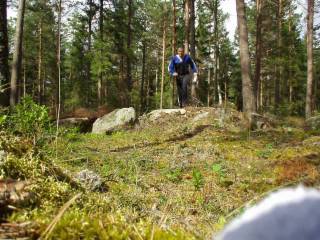 A self portait with the self timer at a place called "Lunsen." posted by Michael | 8:26 PM  The crowd watching an O' race. posted by Michael | 8:24 PM  What is Boris doing? posted by Michael | 8:22 PM  A fast Swedish forest. posted by Michael | 8:20 PM  Emil Wingstedt. posted by Michael | 8:19 PM Sunday, August 29, 2004 Some inspirationSprint O' in NorwayThe Norwegian's had their sprint selection races this weekend. Take a look at Hanne Staff's routes on the morning's course and on the afternoon's course. The afternoon course started on a golf course. Olympic marathon When I got home from my run this morning, I sat down in front of the TV to watch the Olympic men's marathon. Last weekend's women's race was inspiring. Today's men's race was too. The NBC announcers focused their early coverage on Dan Browne. Of the three U.S. runners, Browne had the worst result. Bummer. Browne apparently works with Alberto Salazar. When the commentators mentioned that, I remember watching the 1984 Olympic marathon coverage. Salazar spent a lot of time carefully preparing for the conditions (heat and pollution) he expected at Los Angeles. He was very methodical and scientific. But at the Olympics he just couldn't quite get it all together. When I remembered that I thought, "bad omen for Browne?" I just did a google search and found an article that includes some info about Salazar's efforts to prepare for Los Angeles. When Baldini crossed the finish line, winning the gold, he dropped to his knees. He was happy. I thought, "wow, if I'd run a marathon at an easy pace I'd be afraid to bend my legs like that; I'd probably cramp up." As Meb K. crossed the finish line you could see that Baldini was cramping up. It was, in a strange way, nice to see that Baldini was suffering. posted by Michael | 7:06 PM Saturday, August 28, 2004 Downhill trainingI did some downhill training today. I'm hoping to work on my downhill running this fall and winter.I'm not a good downhill runner. I never have been. But a few years ago I tried to improve my downhill running. It worked. In fact, it worked well. With just a bit of training and practice I started running better downhills on O' courses. When I got hurt, all the training went out the window. Not only did I lose all of my fitness, but I also lost my confidence to run in the terrain. Instead of feeling comfortable running in the woods, I was scared. I was most scared on denial's. I'm feeling a lot better about running in the terrain, so it is time to start working on my downhill running again. Today's session was the first, but I hope not the last. I ran on a foot trail at Weston Bend. I jagged up a hill, then turned around to jog down. On the way back, I put in one minute at a hard effort. I picked a part of the trail that would have some roots, twists and turns, and a couple of logs to jump over. The picture below shows my h.r. and altitude curve for one of the five hills I ran (I ran the same hill five times). The altitude curve shows that I climbed at a fairly steady rate from the bottom of the hill. I kept a steady, but not hard, pace. As I went up the hill my h.r. climbed to about 160. At the top of the hill I took a clunk of water from my water bottle and jagged a short easily for about 30-60 seconds. Then I ran hard down the hill for one minute. You can see on the altitude curve that I lose altitude quickly (compare the slope for the downhill to the uphill). You can see from the h.r. curve that I was working hard. My h.r. climbed to just over 160 in the minute I ran. It was a fun way to train. posted by Michael | 7:54 PM  One of the hills I ran today. Click on the picture for a higher resolution copy. posted by Michael | 7:52 PM Friday, August 27, 2004  Mook near the end of the Crystal Relay. posted by Michael | 8:03 PM An unexpected game situationAs I was thinking about potential "game situations" for a relay I thought back to the WOC relay in Finland in 2001.The US Team was Kenny, Eric, Eddie and me. For teams that were relatively far behind the winners there would be a mass start. The organizers announced (in writing as well as in meetings, I think) that the mass start would take place no sooner than 5 p.m. [Note, I might be wrong about the exact times, but the relative times are correct]. As the relay went it looked like we'd make it before 5 p.m. If Eddie ran as expected, he'd come to the finish in time for me to go out about ten minutes before 5. I began to jog around a bit to loosen up. I started to think about the race. I expected Eddie in about 30 minutes. It must have been about 4:20. I shuffled around for a few minutes, stopped to adjust my shoe and drank some water. I checked my watch and saw I had about 20 minutes before Eddie would arrive. I took a few steps then heard an announcement -- all final leg runners who hadn't started should assemble at the finish line for the start. What? It was only about 4:30. The organizers had specifically said that the mass start wouldn't happen before 5. An official chased me down and told me to hurry to the start. I rushed down to the maps where a group of maybe 10 or 12 of us stood, ready to go. I don't think any of us had warmed up. We waited a minute or two and then took off. The whole experience was rather stressful. But once I had the map in hand I started paying attention to what I was doing. My legs didn't feel great and it took a few hundred meters to feel more-or-less ok. It wasn't a "game situation" I'd prepared for. For what it is worth I had a reasonable run. Not perfect, but not so bad. Near the end I took a chance in an effort to keep Canada within sight. I boomed a tricky control less than a kilometer from the finish...But the Canadian boomed it more. posted by Michael | 7:46 PM Thursday, August 26, 2004 Game situationsIn sports like basketball and football, teams practice game situations. A basketball team might be given a scenario to work through -- you're down by 3 with 15 seconds to go and the ball in backcourt.The Swedish O' team is reportedly practicing some game situations at their final pre-WOC training camp. I wonder what exactly they are up to. While I was running today I spent some time thinking about different scenarios you might run at an O' camp. I'll have to put together a list some time. But not tonight. I'm tired and plan to go to bed soon. Cool web page Check out Ollie O'Brien's clickable map of O' maps in Great Britain. posted by Michael | 8:05 PM Wednesday, August 25, 2004 Ranking notesI came across some discussion of national rankings on the USOF Yahoo group. I only read a couple of the posts but I think I got a sense of the discussion. While I'm not very interested in rankings, it is clear that some people are very interested in them.The discussion spurred a couple of thoughts about rankings. I'd like to see a ranking system where it was easy to calculate your points. It'd be nice if you could look at your results after a race and know how many points you earned. Can you do that under the current system? I don't know. I think a very simple system would be fine. Maybe give the winner on each age group 50 points, 45 for second, 40 for third, and so on (I realize this system doesn't recognize the level of competition). I'd like to see a ranking system that gave greater weight to championship events. The current system (if I understand it correctly) bases your points on results and level of competition. I'd go ahead and give extra credit for rankings earned at a national championship. You could arbitrarily inflate your points by a certain percent for championships. Maybe the top five at a national championship would get their calculated points + 10 percent. What is the point of the rankings? We don't have enough runners in the U.S. to need rankings to select runners for elite classes. The only prize based on rankings are little patches that USOF mails out every year or so. I guess the rankings are considered when national teams get selected, but I don't think the selections would be very different if you didn't have any rankings. posted by Michael | 8:10 PM Tuesday, August 24, 2004  Another Wyoming snapshot. posted by Michael | 8:30 PM Some thoughts about injuriesI hurt my foot a bit running the street orienteering last weekend. So I've spent a little bit of time thinking about injuries. I've also been thinking about injuries because two (maybe even more?) of the North Americans picked to run the WOC have some sort of injury.Then at lunch today I was poking around the internet and read an article by Johan Ivarsson on the benefits of injury. That's a topic you don't think of very often. Someday I'll get around to translating the article. If you can manage Swedish, you can find the article here. I have a theory that I've benefited from a couple of small injuries or illnesses over the years. In the months before the 1987 WOC, I got sick and missed a couple of week of training. In the months before the 1989 WOC, I bruised a knee when I fell on a rock during a night race. I missed a couple of weeks training. In 1980-something I was hit by a car while riding my bike, badly bruising a leg and forcing me to take a couple of weeks off. In 1991, I ran a bit too much, causing some knee pain and leading to a week or two off from running. In all of those examples, I ran well soon after the injury or illness. My theory is that the injury forced me to get the rest I needed, when rest would do me some good. I didn't think that at the time. I was annoyed to miss training. I felt like I'd built up a reasonable level of fitness and the break was hurting me. But in retrospect, I think the breaks were just what I needed. posted by Michael | 8:14 PM Monday, August 23, 2004  Storms heading toward Kansas City tonight. The TV just reported that the storm might bring 6 inches of rain along with heavy winds and, perhaps even a tornado. posted by Michael | 8:55 PM OlympicsI spent a bunch of time this weekend watching the Olympics on TV.I try to write about orienteering each and every day. But, for a change I thought I'd write a few quick thoughts about the Olympics. USA Basketball I've watched parts of a couple of games. I know they haven't done as well as some people expected. But, I think they've got a very good chance to win. The players on the team might not be the best, but they are very, very good. Larry Brown is a great coach. I don't know anything about the other nations' coaches, but it is hard to imagine any other country has a better coach. Good players + good coaching = they ought to figure out how the play the international game. TV Coverage The coverage from Athens is the best I can remember. They show a lot of different sports and seem to spend a fair amount of the TV time showing the action. In years past the coverage seems focused on "up close and personal" stories (where we learn that just about every Olympic athlete has a relative with cancer). Balance beam I can't watch the balance beam coverage. I don't know why, but it looks like every competitor on the balance beam is about to fall and get hurt. The platform diving can also be scary to watch. Is it just me or does it look like every diver is about to smack their head on the platform? Women's Marathon Watching the women's marathon was inspiring. I love watching "suffering sports." We had the TV coverage on and a web browser opened. The Olympics web page had updates every 5Km and you could see the top 15 places. It was kind of cool to see the American (I've already forgotten her name) who finished 3rd. From the web splits we noticed that she was moving up steadily. The web coverage gave you enough information that you could follow the race behind the front, even if the announcers didn't give you as much info. Judging Lots of people don't like sports decided by judges scoring, like gymnastics and diving. I'm not a big fan of scoring sports. But, they'd be more fun to watch if the commentators didn't try to tell you what they expect the scores to be. As soon as the diver hits the water, the announcer will start saying things like, "oh, that won't be any higher than a 6.0." I could complain a lot about commentators....but I don't want to write one of those "ranting" blogs. An Orienteering Idea A few days ago I wrote something about orienteering in the Olympics and JJ wrote a comment that included: Map secrecy might become a lot more difficult if the motivation of Olympic medals were at stake. It's already difficult with the WOC, but this might be far worse. There are ways to nullify this, like by publicizing the map (without course) in advance and allowing people to train freely on it. For sprint events you can deal with secrecy by putting in special barriers for the event-only. In urban sprint courses, the organizers could barricade a street to make it out-of-bounds. That'd help reduce any advantage locals would have and might make course setting more interesting. posted by Michael | 8:31 PM Sunday, August 22, 2004 Valstad's problems at the middle distanceBjornar Valstad had a very good race until the very end of the Norwegian middle distance champs. I'm not up to translating his report, but I'll explain what he had to say.Valstad had some recent trouble with mistakes in the last part of courses. The evening before the race, he spoke with a guy named Johan Kaggestad on the phone. They decided to "restart" the race in the last 1.5 km. To think of the last 1.5 km as a new race, one where he'd have to orienteer well to win. When he came to the final small loop on the middle distance race, Valstad was thinking about restarting...instead of thinking about orienteering. Since he wasn't' thinking about what he was doing, he boomed and lost two minutes. Check out the last little loop where Valstad lost two minutes (it looks like his two booms are on 13 and 14). When I read Valstad's report, I recognized the name "Johan Kaggestad" but I couldn't remember who he was. Google to the rescue! Kaggestad worked with the runners Grete Waitz and Ingrid Kristiansen, which is probably where I recognized the name. posted by Michael | 7:01 PM Saturday, August 21, 2004 Today's street orienteeringOK hosted a very low-key street orienteering event today. Gene designed the course for the annual (though we've missed a few years) Quantrill's Quandary.Most of the control locations are at historical markers related to Quantrill's Raid. When you got to the location you used the information on the historical marker to answer a question on the map. The 4th control's question was "Speers lost how many sons?" The answer is "2." If you're not familiar with Quantrill's Raid all you really need to know is that in 1863 Quantrill -- a sleazy Missourian -- brought a group of "raiders" with him to Lawrence where he killed about 200 people and burned most of the town. It wasn't a battle, it was a massacre. If you're interested in learning a bit more of the history, check out the City of Lawrence Quantrill's Raid page. If you're really interested, google "quantrill's raid" and you'll find lots of reports. One of the strange things (to me, at least) is that you'll bump in to people who consider Quantrill a hero. Some of the pages are actually quite disturbing. Just to give you a sense of that, here is a quote from a page from a school web page in Missouri, "This raid [on Lawrence] was Quantrill's best moment. His gang killed 143 to 216 men (it isn't known for sure how many men he exactly killed.)" "Best moment"???!!! posted by Michael | 7:14 PM 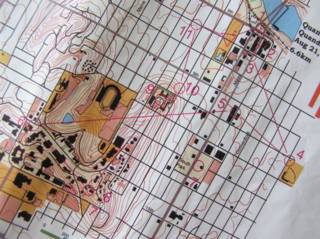 Today's street O' course (set by Gene Wee). White on the map shows private areas. The course is 6.6 km measured on the straight line. posted by Michael | 7:14 PM Friday, August 20, 2004  A Wyoming snapshot. posted by Michael | 7:57 PM Some news from NorwayI spent some time today reading a couple of newspaper articles about the Norwegian Champs (which are also their WOC selection races).One of the big stories is the absence of the national coach. Anders Garderud is the national team coach, but he's also a color commentator for Swedish TV and he's in Athens for the Olympics. Garderud is getting some criticism for being away while the selections are going on. One article points out that not only is Garderud absent from the selection races but, But the truth is that it hasn't gone well in the two championships that "The Swede" [Garderud is Swedish] has been responsible for. The last European Champs, in Denmark, was the first time in history that a Norwegian men's team has come home without medals. But Hanne Staff won a gold and gives Garderud much of the credit for helping her be tougher as a runner. Holger Hott Johansen is something of a North American favorite. So I usually take a look at how he is doing. His first race, the classic champs, didn't go well. He finished 8th: "That may have been my worst race in a long time, maybe in a year," said Hott Johansen, who struggled with both booms and a bad stomach. While Garderud is in Athens, he's getting the results and speaking to the press. Here is what he said about Holger Hott Johansen's race: "I expected a lot more from Holger. Holger can have a bad race, but not two," said Garderud, putting a lot of pressure on Holger for the middle distance races. You can see how it went for Holger (quite well in the middle qualifying race earlier today!) on the Norwegian Champs results page. While you're there, Check out Sandy Hott Johansen in F21 (i.e. "D21" in Norwegian). Her result from the classic looks decent and she ran a nice middle qualifying race today. posted by Michael | 7:34 PM Thursday, August 19, 2004 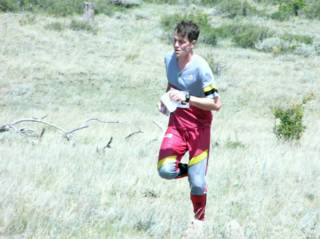 posted by Michael | 8:22 PM A big boomHanne Staff won the Norwegian Champs today. But, she started with a big boom.Check out the map for the first few controls. I had a good run today, after the first control! That won't be enough, at least at the World Champs, if I want to fight for the medals. I started weakly with a nearly three minute boom on the first control. I made a basic mistake. I underestimated the control [note, I'm not sure I've translated that quite right] and was sloppy when I left the boulders... Staff recovered, taking a very safe route to two and then orienteering well the rest of the way to the finish. Speaking of the finish, the last few controls on the course look a bit unusual. posted by Michael | 8:09 PM Wednesday, August 18, 2004 Some comments from Eric and PeterSome interesting comments showed under the photo of Peter a few days ago.Eric wrote: I also wish I had done more running in terrain 20 - 25 years ago. My road running background kept me on the roads more than was ideal, and forest wasn't always available. Eventually I made a transition to trails and forest, but earlier would have been better. Which made me wonder if there are any orienteers who feel they've done too much training in the forest? Orienteers being the way they (we) are, I'm sure there are. Eric also wrote: I think it is important for younger orienteers to do serious, competitive, running races, which tend to be on roads, in order to get past the pain barrier and push the performance level, and the perceived limits, higher than provided by solo running. And Peter wrote something similar: I left out of my comments what I was doing 15-20 years ago and NOT doing now, and that was enough fast running, either hard intervals (which I like to do at the track, because you can't fudge the numbers) or races, both road and trail. Both make you run better and toughen you mentally. There have been times when I've done a lot of road races. Well, maybe not a lot, maybe 15 or so a year. I even ran a couple of track races way back in the early 1980s. I don't think it was until I'd spent a bunch of time in Scandinavia -- a couple of years I'd guess -- that I had the experience of regularly running O' races at an effort that felt comparable to a road race. Having suffered through some hard, if not fast, road races gave me a sense of what it feels like to run at a hard effort. I haven't run a road race in a couple of years. Each year I tell myself I'm going to run some road races. Each year I look back and tell myself, "I should have run a few 5Ks." Maybe this Fall I'll do some road races. posted by Michael | 1:20 PM Tuesday, August 17, 2004 arggghhhhI try not to do stupid things.I also try to plan my training. Today's plan was a hilly run at a park on the way home from work. After work, I drove to the park. I changed into my running clothes. Then I grabbed by running shoes. Two left shoes. I'd packed two left shoes. Arggghhhh. I try not to do stupid things. posted by Michael | 8:05 PM Monday, August 16, 2004 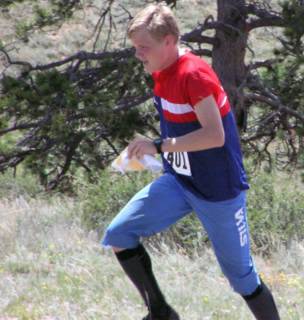 Robbie Paddock posted by Michael | 8:44 PM Olympics and O'Orienteering and the Olympics is an obvious topic. Should O' be in the Olympics? Could O' be in the Olympics? Would it matter?I haven't really given it much thought, but I'm sure I can crank out a few paragraphs... For as long as I've been orienteering (about 24 years), the topic of O' and the Olympics keeps coming up. As far as I can tell, orienteering has never been given a serious chance of getting on the program. Supposedly ski-O has a better chance, but I haven't seen any reason to believe that ski-O has been given a serious chance of making the program. Orienteering seems to be a sport reasonably well suited to the Olympics. It is fair, spread around the world and not so expensive to organize. I know, I know, it doesn't make good TV. Conventional wisdom calls for a sport to be good on TV to have a chance to make the Olympics (hence we've got beach volleyball). Maybe that's true. If O' was in the Olympics would it matter? Would it be a good thing? I suspect it wouldn't really make much difference. Certainly it'd be a bit easier for an orienteer to train a lot more and work or study a lot less. But it wouldn't mean a bunch of orienteers (in the U.S. at least) would get a bunch of money. Being in the Olympics doesn't mean you can stop working (take a look at the U.S. archery team for an example, those folks aren't full time athletes). As an Olympic sport, coaching would probably improve. A few more full-time, professional coaches would be able to get jobs. That'd be positive. I don't think the added publicity would make the sport grow a lot. I think the nature of the sport rather than publicity explains most of the growth of any sport. If O' were in the Olympics it'd change the importance of world champs. I'd guess most people would rather have an Olympic gold than a WOC gold, even if wining a WOC gold might be just as difficult. It'd be a shame to have the most important (i.e. prestigious) event happen only every four years. I suppose it is a moot point as the chances of orienteering showing up in the Olympic program are probably very slim. posted by Michael | 8:20 PM Sunday, August 15, 2004 Stephen's shadowI shadowed Stephen Koehler while I was in Wyoming. Stephen ran M10 and I followed along on the fourth day. Stephen is 7 years old (or as he pointed out "I turned 7 and a half, two days ago.").It was fun. Stephen had some good legs and a couple of small mistakes. When he ran best, he did just what any orienteer would do. He had a clear plan, oriented his map, and looked ahead for the control. Stephen's biggest error probably cost him 40-50 seconds. As we went along a fence, heading toward a fence corner that was near the control, Stephen let his mind wander. He looked at the barbed wire fence and told me that he'd torn a pair of O' pants on a fence like that. Then when we got to the fence corner, Stephen stopped. He wasn't sure what to do. I guess he'd forgotten he was looking for a lone tree about 50 meters away from the fence corner. Stephen studied the map for a few seconds. So I asked him, "what is the control on?" He looked at the map and the IOF description and looked a bit puzzled, but the white course also had English descriptions. He looked at the English description, "ah a tree." He looked up and sprinted over to the tree. Even on a white course and at age 7 and a half...and two days...orienteering is about having a plan, orienting your map, running to the controls and paying attention. posted by Michael | 8:29 PM Saturday, August 14, 2004  Peter Gagarin has been running well this year. In Wyoming, Peter mentioned that one reason for his good form had been lots of training in the terrain. Something he said he wished he'd done more of 20 years ago. posted by Michael | 9:44 PM Friday, August 13, 2004 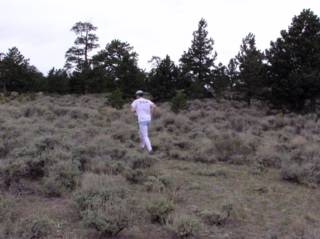 Mook in typical Wyoming O' terrain. Mook was picking up some controls the day after the race. He's not far from control 14 on the long selection race. posted by Michael | 7:40 PM PotentialFrom a Cycle Sport interview with Dirk Demol, one of the coaches/leaders for the U.S. Postal cycling team:You can't turn somebody into a great champion, but you can definitely improve things to the point where they are able to realize their full potential. In the case of Lance, Bruyneel was fundamental to his success in that it was Johan [Bruyneel] who told Lance that he could win the Tour for the first time, who made him concentrate exclusively on taking it. Demol is suggesting that part of what a coach/leader does is convince athletes of their potential. I'd always had a narrower view of coaching, basically that coaches help motivate and provide specific information/knowledge. Convincing an athlete of their potential is, of course, a part of motivation. But, it is a specific part that I hadn't really thought about. For an orienteer having an idea of their potential must matter. If you set your sights too low, you'll never reach your potential. If you set your sights too high, you'll likely get discouraged before you reach your potential. Presumably a coach -- a good coach, that is -- recognizes the level an athlete can reach, then explains it in a way that is convincing. How does a self-coached orienteer figure out what their potential might be? Do we lose good orienteers because they set their sights too high or too low? I'm reminded of an interview an American sports psychologist did with Kent Olsson, who was the world champ at the time of the interview. The American, Charles Parry (if I remember correctly), asked Olsson about his goal. "To win the world champs." Parry remarked that it was a very high goal; maybe too high? "Maybe for you, but not for me," Olsson replied. posted by Michael | 7:18 PM Thursday, August 12, 2004 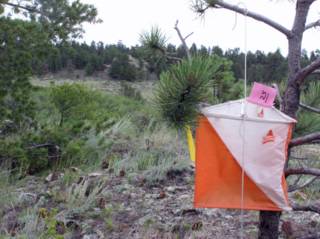 posted by Michael | 7:54 PM Some links to check outIf I was training for the WOC sprint, I'd be taking a look at the Swedish sprint selection race maps. You've got to think they've made an educated guess about the terrain and course setting to expect at WOC.Check out Johan Nasman's routes from the sprint qualification race and from the sprint final race. And also check out Emma Engstrand's routes from the sprint selection race. About two weeks ago I wrote a bit about an article on Bernt Bjornsgaards training. At the time I didn't feel like putting in the time to translate the article. I still don't. But, the fine folks at Fasterskier.com have translated the article to English. It is worth a look. posted by Michael | 7:42 PM Wednesday, August 11, 2004 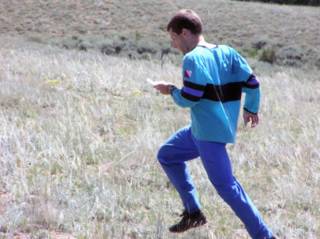 Eddie Bergeron on his way to winning the Crystal Relays. posted by Michael | 8:27 PM How many runners to send to the WOCAt a team meeting in Wyoming last week, Mikell Platt suggested that the U.S. might want to send more than 4 men and 4 women to WOCs. The idea came up a few years ago and the "executive steering committee" clearly didn't want to send any more than 4 men and 4 women.I think sending more than 4 and 4 would probably be a good idea. In thinking about how many people to send, it is worth answering a couple of questions: What is the minimum and maximum number of races a nation could get during a WOC? How many runners do other nations send? Minimum and maximum races Each country gets up to three runners in each qualifying race and relay teams have three runners. A nation that didn't qualify any runners for finals would get 3 sprint qualification runs, 3 middle qualification runs, 3 long qualification runs and 3 relay runs. That's 12 races (and, of course, the men get 12 and the women get 12 so the total is 24). The maximum number of runners would be 3 sprint qualification runs, 3 sprint finals runs, 3 middle qualification runs, 3 middle qualification finals, 3 long qualification runs, 3 long final runs and 3 relay runs. That's 21 races (42 for men and women together). How many runners do other nations send? The WOC home page has a list of entries. 37 nations are listed. The most athletes a nation can send is 14 (7 men and 7 women). 6 nations plan to send the maximum. 7 nations plan to send 10-13 runners. 5 nations plan to send 9 runners. 5 nations -- including the U.S. -- plan to send 8 runners. 11 nations plan to send 3-7 runners. 3 nations will send just one runner each. The median and average number of runners a nation sends are 8. I took a look at the number of runners the U.S. peer nations plan to send. My peer nations for the U.S. are: Portugal, Slovakia, New Zealand, France, Bulgaria, Belgium, Canada, Japan, Poland and Ireland. In terms of how many runners a nation sends, the U.S. sits right in the middle of the peer nations. Four nations plan to send more (Japan, Belgium, France and Ireland), four nations plan to send fewer (Poland, Bulgaria, New Zealand and Slovakia). Canada, Portugal and the U.S. all plan to send 8 runners each. posted by Michael | 8:02 PM Tuesday, August 10, 2004  I took this snapshot in Wyoming...what do you suppose Nadim is doing? posted by Michael | 8:11 PM How to buy a T-shirtIn Wyoming several people asked me how to get their very own Night Orienteering Is Not a Crime T-shirt. It is quite easy.1. Get out your credit card. 2. Point your browser to the Night O' Is Not a Crime T-shirt. 3. Place your order. The shirts cost $14.99 (which is the minimum price...I don't make anything on it) and make great gifts. Old men? This year's U.S. WOC men look to strong. They also look old. I wonder if this is the oldest men's team we've ever sent to a WOC? Brian May is 33. Mikell Platt is 46 (I think). Eddie Bergeron is 35 (I think). James Scarborough is 30. posted by Michael | 7:58 PM Monday, August 09, 2004  Click the image for a higher resolution image of my heart rate and altitude for a race in Wyoming. You can see dips in the hr curve when I drank some water at number 4, as I approached the 9th control slowly and carefully, and when I boomed the 10th control. You can also see a long climb from just past the 4th control to about the 9th control. That was a tough climb...especially given the altitude of about 8000 feet above sea level. posted by Michael | 10:06 PM Setting goals for WOCAt the team trials the U.S. selected the WOC team and had a meeting where the team talked about goals. I think that's great. I'm a big fan of having the team having some goals. I think paying attention to goals and results can only help improve performance over time. If nothing else, it makes it more fun to follow the WOC.Brian May spent some time putting together a simple method for aggregating results for each nation. You can read the discussion at Attackpoint and see his calculations for the 1993 and 2003 WOCs. While no method is going to be perfect, Brian's approach is fairly easy to calculate and gives a nice summary of how every nation did. To look at a nation's development over time you could either look at the overall ranking or make some adjustments for the number of events and compare a nation's score over time. One problem -- not much of a problem, really -- is that calculating the scores isn't easy if you don't have a spreadsheet. Actually, it isn't hard to do by hand it just takes a bit of time. It'd be nice if you could look at the results board at the end of a WOC race and quickly figure out how many points you've scored. You could get pretty close by subrtracting each runner's place from the total number of starters in the race, then summing those scores for a nation. For example, if the sprint final had 45 runners and the U.S. had runners who finished 20th, 25th and 30th, the U.S. scores would be 45-20=25 plus 45-25=20 plus 45-30=15. The U.S. total would then be 25+20+15=60 points. That's simple to calculate without a spreadsheet. I think Brian's approach is quite nice and is a good complement to a peer nations approach. posted by Michael | 9:35 PM Sunday, August 08, 2004 Mook's hard fought relay legRelays are great. I the Crystal Relays yesterday. I ran with Dick N., Peggy D., and Mark (aka Mook) E. Mook, being the strongest orienteer from OK, took the last leg and had a hard fight.Mook went out a few minutes behind DVOA's Clem McGrath and NMO's Eddy Hellebuyck. The course was designed with spectators in mind. We had chances to see the runners at three or four spots on the course and the last couple of legs made a small loop around the finish area. Mook got by Clem quickly. Apparently Clem boomed the first or second control. With about 4 km to go, we saw Mook crossing a hillside with Eddy on his heels. Normally, you can count on Mook to dust just about anyone. But, Eddy is a very good runner. With about 2 km to go, Mook appeared on the hillside again. Eddy was still there. Suddenly, Eddy moved. I hate to admit it, but my first thought was, "Mook won't be able to keep up, it is over." I should have known better. Mook would fight Eddy to the end. Check out the snapshots below to follow the last bit of the race. posted by Michael | 7:45 PM 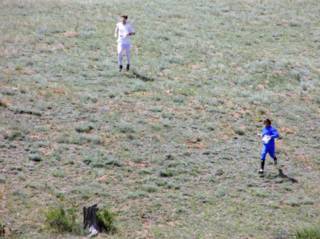 Mook and Eddy went back and forth as they ran across a hill side, then down a hill toward a reentrant. The control in the bottom of the reentrant was about 500 meters from the finish line. In this snapshot, Eddy has opened a bit of a lead on Mook. posted by Michael | 7:44 PM 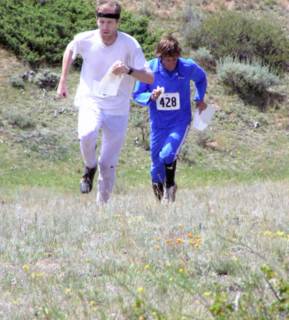 With a couple of hundred meters and three controls left, Mook pushed the pace up the last hill. Eddy worked hard to hang on Mook. posted by Michael | 7:43 PM  Going to the last control (you can catch a glimpse of the marker on the tree to the right), Eddy has a few meters on Mook. He held that to the finish line. A tough, hard fought last leg. Mook might not have won this race, but he's stronger than ever after a good fight. posted by Michael | 7:41 PM Friday, August 06, 2004 posted by Michael | 5:59 PM posted by Michael | 9:30 AM Thursday, August 05, 2004 posted by Michael | 12:08 PM Wednesday, August 04, 2004 posted by Michael | 9:06 AM Tuesday, August 03, 2004 Road trip begins soonI'll hit the road in a few hours. My goal is to get a bit of the way across Nebraska, making the drive tomorrow reasonable.When I go out of town I don't usually update this page. But this time I'll make an effort to post audio updates from my mobile phone. New control picking record O-Nett reports that "Gorgeous Terry's" personal record for controls on a course is actually 115, not the 100 reported earlier. I wonder if there were O' markers hung at each point or if he just drew a course with 115 controls on distinct features and then ran the course. My guess is he just drew a course. posted by Michael | 1:27 PM Monday, August 02, 2004 Some quick linksI don't have much time right now, gotta do some laundry and organize for my road trip. I hit the road to the 1000-days in Wyoming tomorrow after work.Check out Yep Sport for an interesting report from this year's Swedish 5-Days and reports from amazingly uninteresting looking British terrain. Take a look at the M21 and F21 courses from a race in Sweden yesterday. Nice terrain and courses. Finally, take a look at a combined GPS/heart rate monitor/analysis toy (or it is a "tool") from Finland called FRWD. posted by Michael | 6:39 PM Sunday, August 01, 2004 107 controlsO-nett reported that some Norwegians set an "unofficial world record" for the most controls on a course -- 107 controls on a 12 km course.According to O-nett, the prior record was 100 controls by Thierry Gueorgiou. Jamie Stevenson and a couple of British runners have also run 100 control courses. As far as I know, my personal record is 62 controls on a training course I ran at Knob Noster last year. I remember having fun and thinking it was pretty good training. I also remember stepping on a thorn that went straight through the bottom of my O' shoe and about half an inch into the bottom of my foot. Ouch. I'll be in Wyoming later this week and I might just set another long control-picking course for training. I'm not sure I'm up to 100 controls. But, maybe I'll give it a try. * In reading the Norwegian article I learned that France's World Champ, Thierry Gueorgiou, is known among some Norwegians as "Terje Gundersen." In the U.S. I've heard of Thierry Gueorgiou referred to as "Georgeous Terry." (populært kalt Terje Gundersen blant nordmenn). posted by Michael | 8:04 PM |
|
||||
|
|
|||||